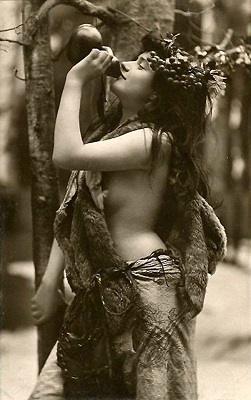Maenades
female followers in the retinue of Dionysus. They travelled alone and were gathering tribute for their god
"Dionysus holds this office, to join in dances, to laugh with the flute, and to bring an end to cares, whenever the delight of the grape comes at the feasts of the gods, and in ivy-bearing banquets the goblet sheds sleep over men."
[Euripides, Bacchanals 380]
"The god, the son of Zeus, delights in banquets, and loves Peace, giver of riches, goddess who nourishes youths. To the blessed and to the less fortunate, he gives an equal pleasure from wine that banishes grief."
[Euripides, Bacchanals 420]
The MAENADS or Bacchants are women sacred to Dionysus, maddened by his inspiring power.
Outfit
The MAENADS are followers of the god of the vine. They bore the thyrsos, a staff that is crowned with ivy, and wore the skin of a panther, a beast loved by Dionysus for being among the most excitable of animals. The MAENADS also put a snake over their locks, for Zeus crowned his son with snakes when he let him come out of his thigh.
Soldiers of Dionysus
Since Dionysus discovered the precious nectar of the vine, he was resisted by several who opposed the introduction of his rites. The MAENADS then, acting like soldiers, favored the god and his rites, and fought against his impious enemies, such as Pentheus and Lycurgus; but also Orpheus was killed by them for disputed reasons.
Their inspiration
The MAENADS have been reported to be able to perform miracles, for it has been said that where one of them stroke the ground with her thyrsos, there came forth a stream of wine, and when they scratched the earth with their fingers they obtained streams of milk. And it has also been told that from the thyrsos dripped honey.
The MAENADS could do such things, they say, because they were possessed and not in their senses. Their playing and dancing, it is said, should not be quelled, for the MUSES love the flute, and they would be angered by those attempting to pacify and put down these god-inspired women.
Their fury
But they were also known for being most cruel against the enemies of the god they worshipped. For being possessed by the unusual strength that came from bacchic frenzy, they could tear apart whoever came in their way, as it happened to King Pentheus of Thebes, who was torn limb by limb by them. And they could rout armies, for they could not be wounded when touched by enemy weapons, but they inflicted casualties on their opponents by hurling the thyrsoi at them.
It is also said that they could carry heavy objects on their shoulders without holding them with bounds, and that they carried fire on their locks without being burned. So, possessing such amazing qualities, they could fall upon towns, turning everything upside down, for no one could resist them. And yet it is told that the MAENADS were imprisoned by King Lycurgus (known for being fond of cutting people to pieces, and for decorating his gates with their extremities), the first to oppose Dionysus, some say in Thrace.
Young god
Dionysus traveled through Lydia and Phrygia in Asia Minor, coming also to India. Assisted by the MAENADS and the SATYRS, he set to dance all those nations, establishing his mysteries, so that all would acknowledge him as a deity. This was no easy task because Dionysus was a late comer (he was the grandson of Cadmus, the founder of Thebes) and also because mortals are easily scared.
But the MAENADS, with their many wonders, proved that they were possessed and inspired by a god. And those who were unwilling to accept Dionysus, the general of the MAENADS, were ruined, to let them understand what it meant no to be initiated in the Bacchic rites.
Many from abroad
Since Dionysus conquered the East before he came to Hellas, many forming his sacred band were recruited among those called barbarians, who came with the Phrygian drums which Dionysus invented, along with Rhea, the mother of the gods. The MAENADS celebrated this god of delight with hymns, and knowing his rites and having their souls initiated in the Bacchic revels, kept their lives pure, danced in inspired frenzy, and performed holy purifications, accompanying themselves with the heavy beat of drums.
[1]













